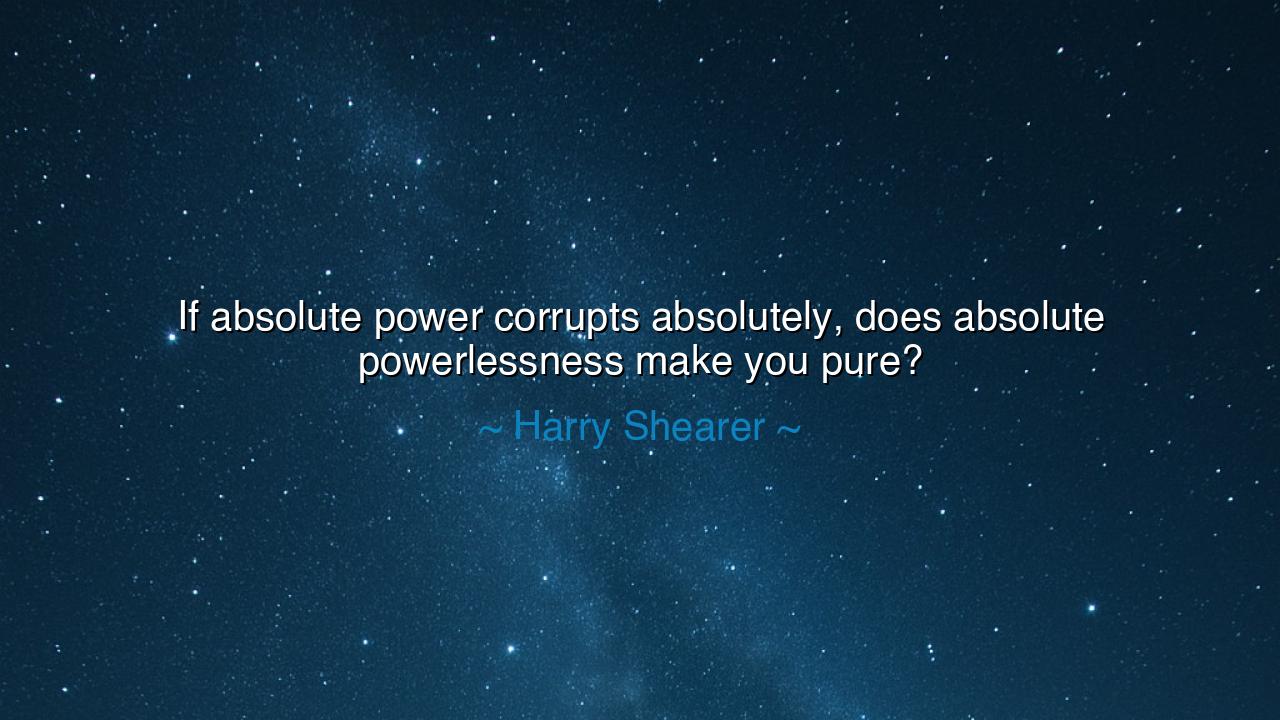
If absolute power corrupts absolutely, does absolute






In the words of Harry Shearer—“If absolute power corrupts absolutely, does absolute powerlessness make you pure?”—we are invited into a paradox as sharp as a double-edged sword. Lord Acton warned that absolute power bends the human soul toward pride and corruption. But Shearer, in turning the saying on its head, asks whether the opposite—absolute powerlessness—would then yield innocence, virtue, or purity. It is a question both ironic and profound, for it forces us to confront the relationship between circumstance and character.
The ancients often wrestled with such riddles. In the dialogues of Plato, Socrates argued that virtue is not merely a product of circumstance, but of knowledge and choice. A man who is powerless is not necessarily pure—he may simply lack the means to act upon his darker desires. Thus Shearer’s question touches on the eternal tension: does morality come from within, or is it shaped by the scope of one’s power?
History gives us sobering lessons. The slaves of Rome, stripped of all rights, lived in absolute powerlessness. Some bore this with dignity and patience, but others, when given the chance, rose in furious revolt under leaders like Spartacus, proving that oppression breeds both resilience and vengeance. Their condition did not make them angels nor devils—it revealed that purity and corruption belong not to power itself, but to the choices made within its reach.
Yet Shearer’s irony also exposes the danger of romanticizing weakness. To be without power is often to be voiceless, vulnerable, and unable to shape one’s destiny. Purity born of powerlessness may not be virtue at all, but silence imposed by chains. The ancient Hebrews in Egypt, enslaved for generations, were not made “pure” by suffering—they longed for freedom, and when at last they escaped, they too stumbled, doubted, and sinned in the wilderness.
Thus, let us take this teaching to heart: neither absolute power nor absolute powerlessness guarantees corruption or purity. These states reveal, but do not define, the human heart. The challenge of existence is to seek virtue whether we stand at the pinnacle of authority or at the depth of helplessness. For true purity lies not in the absence of power, but in the steadfast use of freedom—whether great or small—in service of justice, humility, and love.






TTluong thi thanh
This feels like both a joke and a profound question. It points to the irony that while we condemn those who wield power, we rarely ask what moral virtue means for those who have none. Is purity just the privilege of the powerless, or does true morality require the courage to act responsibly with power? It’s an uncomfortable, but necessary, thought experiment.
APNhut anh Phan
I appreciate how this question exposes the gray areas in moral philosophy. It’s easy to blame corruption on power, but that oversimplifies human behavior. Some people stay pure even when given authority, while others grow bitter without it. Maybe power doesn’t corrupt—it reveals. And maybe powerlessness doesn’t purify—it hides what’s inside until circumstances change.
PTPhong Thanh
It’s a clever inversion of a classic saying, but it also feels unsettling. Absolute powerlessness sounds noble in theory, but in reality, it often means oppression or silence. Can purity exist without the freedom to act? Perhaps purity requires some degree of agency—otherwise, it’s just passivity. This makes me think that moral strength depends on choice, not the absence of power.
MBMiu Bach
This line feels like a moral riddle. It questions whether our ethical worth depends on our circumstances or our choices. People often equate power with temptation, but powerless individuals can still harbor selfishness, envy, or malice. Maybe purity has little to do with external power and more to do with internal control—our ability to govern ourselves, regardless of what authority we hold.
QAQuynh Anh
I find this quote fascinating because it forces us to confront the relationship between power and morality. If corruption grows with control, does virtue grow with helplessness? Not necessarily—being powerless doesn’t mean being good, it might just mean being irrelevant to the system. Perhaps true purity is found not in weakness or dominance, but in the awareness of one’s influence and restraint in using it.